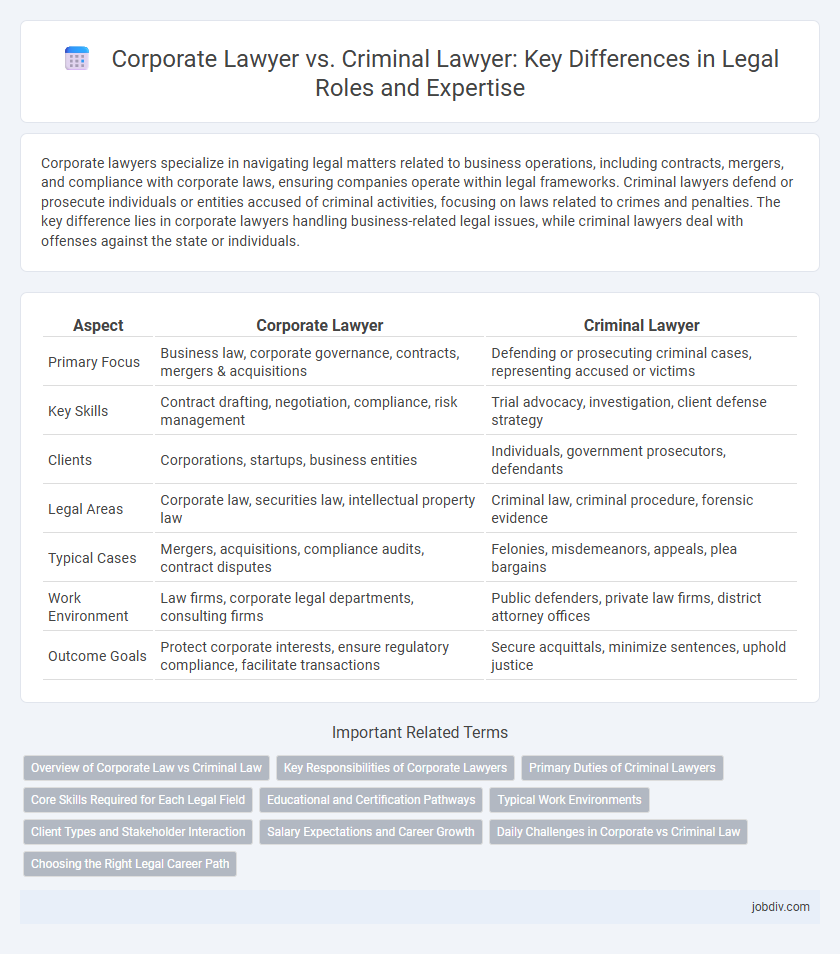Corporate lawyers specialize in navigating legal matters related to business operations, including contracts, mergers, and compliance with corporate laws, ensuring companies operate within legal frameworks. Criminal lawyers defend or prosecute individuals or entities accused of criminal activities, focusing on laws related to crimes and penalties. The key difference lies in corporate lawyers handling business-related legal issues, while criminal lawyers deal with offenses against the state or individuals.
Table of Comparison
| Aspect | Corporate Lawyer | Criminal Lawyer |
|---|---|---|
| Primary Focus | Business law, corporate governance, contracts, mergers & acquisitions | Defending or prosecuting criminal cases, representing accused or victims |
| Key Skills | Contract drafting, negotiation, compliance, risk management | Trial advocacy, investigation, client defense strategy |
| Clients | Corporations, startups, business entities | Individuals, government prosecutors, defendants |
| Legal Areas | Corporate law, securities law, intellectual property law | Criminal law, criminal procedure, forensic evidence |
| Typical Cases | Mergers, acquisitions, compliance audits, contract disputes | Felonies, misdemeanors, appeals, plea bargains |
| Work Environment | Law firms, corporate legal departments, consulting firms | Public defenders, private law firms, district attorney offices |
| Outcome Goals | Protect corporate interests, ensure regulatory compliance, facilitate transactions | Secure acquittals, minimize sentences, uphold justice |
Overview of Corporate Law vs Criminal Law
Corporate law governs the formation, operation, and dissolution of corporations, focusing on regulatory compliance, contracts, mergers, and acquisitions. Criminal law addresses offenses against the state or public, including prosecution and defense of crimes such as theft, assault, and fraud. Corporate lawyers specialize in business-related legal matters, whereas criminal lawyers handle cases involving allegations of criminal conduct and courtroom litigation.
Key Responsibilities of Corporate Lawyers
Corporate lawyers specialize in advising businesses on legal matters such as mergers and acquisitions, contract negotiations, and regulatory compliance. They draft and review corporate documents, ensuring adherence to statutory requirements and protecting company interests. Their role also involves managing corporate governance issues and facilitating dispute resolution within corporate frameworks.
Primary Duties of Criminal Lawyers
Criminal lawyers specialize in defending individuals and entities accused of criminal conduct by representing clients in court, negotiating plea bargains, and advising on rights during investigations. Their primary duties include analyzing case evidence, interviewing witnesses, and crafting strong defense strategies to ensure fair trials. They also work closely with prosecutors and law enforcement to challenge the prosecution's case and protect their clients from wrongful convictions.
Core Skills Required for Each Legal Field
Corporate lawyers require expertise in contract negotiation, corporate governance, mergers and acquisitions, and regulatory compliance to navigate complex business transactions and legal frameworks. Criminal lawyers need strong skills in trial advocacy, legal research, evidence analysis, and plea bargaining to defend clients in criminal proceedings effectively. Both fields demand exceptional analytical thinking, communication, and ethical judgment tailored to their specific legal challenges.
Educational and Certification Pathways
Corporate lawyers typically pursue a Juris Doctor (JD) degree followed by passing the state bar exam, with additional certifications in corporate law or business law enhancing their expertise. Criminal lawyers also obtain a JD and pass the bar exam but may seek specialized certifications in criminal law or trial advocacy to strengthen courtroom skills. Both fields require continuous legal education and state-specific licensing to maintain professional competence.
Typical Work Environments
Corporate lawyers typically work in law firms, corporate legal departments, or government agencies, focusing on mergers, acquisitions, compliance, and contract negotiations. Criminal lawyers often operate within public defender offices, private practices, or district attorney's offices, representing clients in criminal trials, plea bargaining, and investigations. Both professions demand long hours but differ in courtroom presence, with criminal lawyers spending more time in litigation settings.
Client Types and Stakeholder Interaction
Corporate lawyers primarily represent businesses, handling contracts, mergers, and regulatory compliance, engaging with executives, shareholders, and regulatory agencies to protect corporate interests. Criminal lawyers defend individuals or entities accused of crimes, interacting closely with clients, law enforcement, prosecutors, and judges to ensure fair trial proceedings. The distinct client types dictate specialized communication strategies and stakeholder roles aligned with either corporate governance or criminal justice systems.
Salary Expectations and Career Growth
Corporate lawyers typically earn higher salaries compared to criminal lawyers, with median annual wages ranging from $120,000 to $200,000 depending on firm size and location. Career growth for corporate lawyers often includes advancement to partner positions or in-house counsel roles within major corporations, offering substantial financial incentives and job stability. Criminal lawyers may experience slower salary growth but often find career advancement in public defender's offices, private practice, or as prosecutors, with opportunities to specialize in high-profile cases that can enhance earnings.
Daily Challenges in Corporate vs Criminal Law
Corporate lawyers navigate complex regulatory compliance, contract negotiations, and mergers, often managing high-stakes financial transactions under tight deadlines. Criminal lawyers face intense courtroom pressure, handling diverse cases ranging from misdemeanors to serious felonies, requiring rapid legal strategy adjustments and strong advocacy skills. Both fields demand extensive legal research, client interaction, and the ability to interpret evolving laws, but differ significantly in focus and procedural environments.
Choosing the Right Legal Career Path
Choosing between a corporate lawyer and a criminal lawyer depends on your interest in business law and transactional work versus criminal defense and prosecution. Corporate lawyers handle mergers, acquisitions, compliance, and contracts for businesses, requiring strong analytical skills and attention to detail. Criminal lawyers focus on defending or prosecuting individuals accused of crimes, demanding courtroom prowess and a deep understanding of criminal law and procedure.
Corporate Lawyer vs Criminal Lawyer Infographic

 jobdiv.com
jobdiv.com